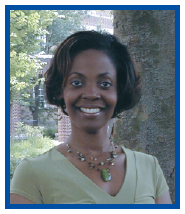|

As a little girl, I can recall attending funeral services of many older family members. Like any child, I asked lots of questions about death. Though I felt sad for the immediate members of the deceased, I remember being positively anxious and unafraid to view the remains. I was curious about how someone who once lived and now (according to my faith and understanding) was a lifeless shell could yet look so alive in a casket.
When I began my undergraduate career, I chose biology - pre-med as my major because I had a general interest in medical science. This major exposed me to a wide range of classes that dealt with a variety of health issues that were present in both my family and community. Although my undergraduate degree from Tougaloo (MS) College was traditional in a sense that it typically prepared a student to pursue a medical degree, it was never my intent to go to medical school. I was always, however, inquisitively fascinated with the preservation of the dead. So, after acquiring my bachelor in science degree, I sought to satisfy my curiosity and intellectual interest by pursuing a mortuary science degree at Gupton-Jones College of Funeral Service and Mortuary Science in Atlanta (Decatur), GA. Little did I know that my fascination involved more than just preservation techniques, but how in death, the life story of a person is more evident, especially pertaining to health. This revelation became more evident when I worked as a forensic intern at the medical examinerís office in Atlanta. It was during this opportunity that I learned how to perform autopsies. To my surprise, the decision to become a funeral director was not always supported. What many people donít know is that this discipline is male dominated, highly competitive and favors family legacy, particularly from a business perspective. So, my aspiration in this line of work really did not fit the mold, especially since I am the only person in my family who has become a funeral practitioner.
After intense training in funeral service, I earned a mortician/funeral director license in three states: Delaware, Maryland and Virginia, and became the youngest manager of nine locations in a firm that had twelve locations in the Delmarva area. It was during this chapter in my life that I discovered that I really had a unique and nontraditional science background coupled with leadership skills, networking ability and effective oral and written communication capabilities that could be utilized on a grander scale. Therefore, I became interested in pursuing a career that addressed three things: science education, leadership and organizational dynamics.
|
I have the awesome opportunity to serve as program coordinator of the Howard Hughes Medical Institute’s NUCLEUS Program, the National Institute of Health’s Bridges to the Baccalaureate and the Department of Defense Research Programs at the University of Delaware. These programs share a common goal, which is to recruit and retain historically underrepresented minority students majoring in science, technology, engineering and mathematics (STEM) fields. Since the representations of African Americans, Hispanics and Native Americans are admissibly low in biomedical science, particularly in research, the need for programs (just mentioned) is paramount.
My position allows me to develop ideas and procedures in accordance with each program’s goals and objectives. More specifically, my professional experience involves supplemental course advisement, mentoring, retention management, coordinating partnerships with other colleges and industry, facilitating the process of connected degree programs, extensive grant writing and collaboration with students, academic departments and administration.
In closing, my unique educational background and work experience have framed my duties and daily activities in a higher educational environment into a clearer perspective. More importantly, I believe that my experiences in funeral service have allowed me to serve in education with compassion, candor and care that are unique to the student population. Even though I don’t currently practice mortuary science, the attributes it takes to function in that line of work are the same attributes required to work in education. Being a funeral director, an embalmer, a mortician, an undertaker (or whatever people want to label it) has enabled me to develop critical thinking skills, oral and written communication skills, listening and discipline. Finally, I believe these qualities have uniquely prepared me for the rigors of my current academic pursuit of a degree in the Educational Leadership Doctoral Program.
Though I mastered embalming and restorative art techniques, working with families whom I shared a common ethnic origin and whose loved ones succumbed to a variety of diseases that are more prevalent in ethnic groups became a dismal pattern. I began asking a series of questions: “Why do African Americans have the highest incidence and mortality rates in certain diseases? Where are the African American biomedical scientists, many of whom share common cultural knowledge, who can help find viable treatments and cures to diseases that plague my community? How can issues concerning health disparities be appropriately addressed in ethnic communities?” As the program coordinator of three undergraduate science education programs, I am finding the answers to these questions.
─ Jacqueline N. Aldridge
|